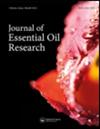β-Cyclodextrin inclusion complexes of combined Moroccan Rosmarinus officinalis, Lavandula angustifolia and Citrus aurantium volatile oil: production optimization and release kinetics in food models
IF 2.1
3区 农林科学
Q3 CHEMISTRY, APPLIED
引用次数: 1
Abstract
ABSTRACT A combined volatile oil (VO) was extracted from Rosmarinus officinalis, Lavandula angustifolia and Citrus aurantium by simultaneous hydro- and steam-distillation, and encapsulated in β-cyclodextrin by co-precipitation. Response surface methodology (RSM) was used to optimize microencapsulation conditions. The variable recovered powder, VO retention degree, and inclusion efficiency were investigated based on two factors: solid-to-liquid and liquid-to-liquid (ethanol/water) ratios. The responses were influenced by the concentration of ethanol in the reaction mixture and the amount of VO used. VO release from the inclusion complexes was investigated in 10% ethanol and in 3% acetic acid. The obtained data were fitted to the first-order Korsmeyer-Peppas, Higuchi, and Peppas-Sahlin models. The Higuchi model gave the fittest approach for the VO release profile in both cases, showing that the release mechanism was controlled by Fickian diffusion.摩洛哥迷迭香、薰衣草、金柑挥发油复合物β-环糊精包合物的生产优化及食品模型释放动力学研究
摘要/ ABSTRACT摘要:以迷迭香、薰衣草和金柑为原料,采用水合蒸馏法提取复方挥发油,并用共沉淀法包封于β-环糊精中。采用响应面法(RSM)优化微胶囊化条件。以料液比和液液比(乙醇/水)为考察因素,考察了回收粉末、VO保留度和包合效率的变化规律。反应反应受反应混合物中乙醇浓度和VO用量的影响。研究了包合物在10%乙醇和3%醋酸中VO的释放。所得数据拟合至一阶Korsmeyer-Peppas、Higuchi和Peppas-Sahlin模型。Higuchi模型给出了两种情况下VO释放曲线的最合适方法,表明释放机制受菲克扩散控制。
本文章由计算机程序翻译,如有差异,请以英文原文为准。
求助全文
约1分钟内获得全文
求助全文
来源期刊

Journal of Essential Oil Research
工程技术-食品科技
CiteScore
6.00
自引率
3.30%
发文量
52
审稿时长
18-36 weeks
期刊介绍:
Journal of Essential Oil Research ( JEOR) is the major forum for the publication of essential oil research and analysis. Each issue includes studies performed on the chemical composition of some of the 20,000 aromatic plants known in the plant kingdom. JEOR is devoted entirely to all phases of research from every corner of the world by the experts in their field. JEOR''s main areas of focus include:
-Analytical chemistry-
Biological activity-
Biotechnology-
Chemical composition-
Chemical synthesis-
Chemosystematics-
Microbiological activity-
Plant biochemistry/biosynthesis-
Toxicology.
Published six times per year, JEOR provides articles on the aromatic principles of a plant or its isolates and are directed toward furthering our readers'' knowledge of the aromatic plant and animal kingdoms.
 求助内容:
求助内容: 应助结果提醒方式:
应助结果提醒方式:


